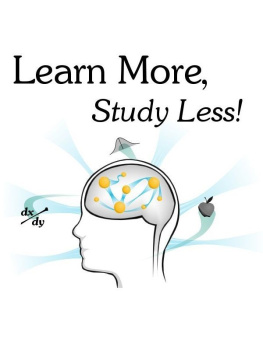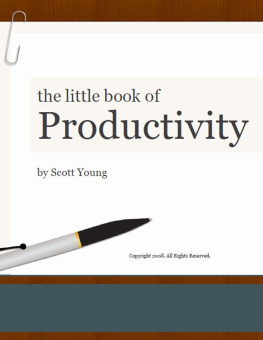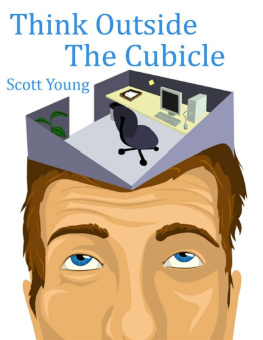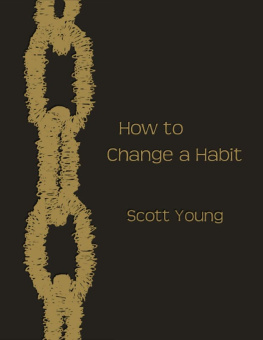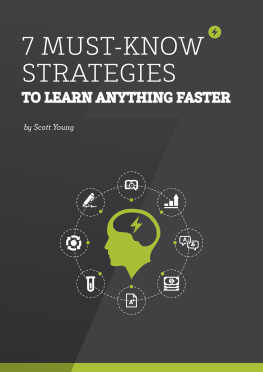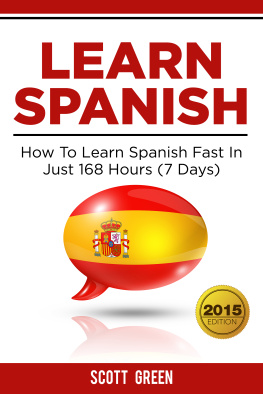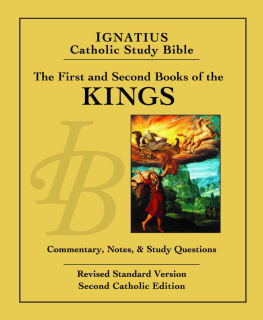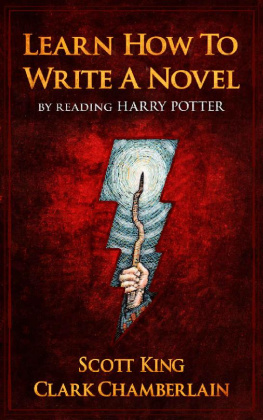Scott Young - Learn More, Study Less!
Here you can read online Scott Young - Learn More, Study Less! full text of the book (entire story) in english for free. Download pdf and epub, get meaning, cover and reviews about this ebook. year: 2010, genre: Science. Description of the work, (preface) as well as reviews are available. Best literature library LitArk.com created for fans of good reading and offers a wide selection of genres:
Romance novel
Science fiction
Adventure
Detective
Science
History
Home and family
Prose
Art
Politics
Computer
Non-fiction
Religion
Business
Children
Humor
Choose a favorite category and find really read worthwhile books. Enjoy immersion in the world of imagination, feel the emotions of the characters or learn something new for yourself, make an fascinating discovery.
- Book:Learn More, Study Less!
- Author:
- Genre:
- Year:2010
- Rating:3 / 5
- Favourites:Add to favourites
- Your mark:
- 60
- 1
- 2
- 3
- 4
- 5
Learn More, Study Less!: summary, description and annotation
We offer to read an annotation, description, summary or preface (depends on what the author of the book "Learn More, Study Less!" wrote himself). If you haven't found the necessary information about the book — write in the comments, we will try to find it.
Learn More, Study Less! — read online for free the complete book (whole text) full work
Below is the text of the book, divided by pages. System saving the place of the last page read, allows you to conveniently read the book "Learn More, Study Less!" online for free, without having to search again every time where you left off. Put a bookmark, and you can go to the page where you finished reading at any time.
Font size:
Interval:
Bookmark:

Table of Contents
If you understand something in only one way, then you don't really understand it at all. The secret of what anything means to us depends on how we've connected it to all other things we know. Well connected representations let you turn ideas around in your mind, to envision things from many perspectives until you find one that works for you. And that's what we mean by thinking!
-Marvin Minsky
Copyright 2010, Scott Young All Rights Reserved
What makes somebody smart?
Is it raw brainpower? Accumulated knowledge? Is it just academic learning or does it also include your experiences, people skills and intuition?
Intelligence is difficult to define. Although IQ tests and various exams try to measure it, deciding what makes somebody smart is hard to do. I prefer to avoid universal definitions and focus on a more practical one:
Being smart means being able to learn quickly remember a large amount of information and be able to sort that information in a way that achieves your goals.
This is a much more personal definition. Learning goals can differ from person to person. You might just want to get As in all your courses. John might want to become a master at computer programming. Susan might want to retain more from the books she reads in her spare time. Another person might want to be able to apply concepts to business situations.
Its up to you to decide what being smart means.
This book isnt about reaching an arbitrary definition of intelligence. Rather, its about giving you a strategy for learning. From this strategy, called holistic learning, Ill provide a set of different tools to put that theory into practice.
Some of these tools wont fit your learning style or goals. Thats fine. My hopes is to provide a large assortment of tools that, with the backing of the holistic learning strategy, you can use to tailor your own approach. With practice many of these techniques can become powerful weapons in your learning arsenal.
This book has two major goals. First, the holistic learning strategy should give you a model for how to learn better. Without an easily understandable theory of learning, it is difficult to make improvements. By seeing the holistic learning strategy you have a basis for identifying your weaknesses and improving the way you learn.
The second objective of this book is to provide a variety of learning techniques. Throughout the book Ill explain what these techniques are and how they fit within the holistic learning strategy. Included with this book are exercise printouts so you can practice these methods.
I wish you the best of luck in all your learning efforts and hope you enjoy the book. It took a great deal of effort, tweaking and experimentation to write. Hopefully that effort has been well invested and you can improve the way you think.
Ive always been able to learn quickly. Getting As and A+s with little studying before tests wasnt a challenge for me throughout school. While in University, Ive maintained an average that sits between A and A+. Despite this, I dont spend more than the average person on homework. In fact, I might even spend less.
Once, I wrote an inter-provincial test (Im Canadian) for chemistry. The only problem: I didnt know I was supposed to write the test until a pencil and bubble sheet were sitting in front of me. On top of this, the test was on material I wasnt familiar with and topics that were never covered in my class. I was given an hour and a half to write the exam. I left after forty minutes because I wanted to eat lunch.
I won first place and received a check for $400.
Self-learning has also occupied my time. Ive taught myself several programming languages, business and writing skills and my bookshelf has hundreds of books Ive read in just the past two years. Ive also dabbled in graphic design, musical composition and anything I could get my hands on.
Learning has always come easily to me.
Up until this point, Id just be another smart kid. Gifted might fit as well, although there are people whose mental feats would put my small achievements to shame. Id be just another kid who got a more favorable genetic cocktail, had pushy parents or some sort of glandular accident.
And if you read this far, you could probably slap on arrogant and boastful.
Until recently I probably would have agreed with you. But then something strange happened. I began to notice something different about myself and people even smarter than me. It wasnt just that smart people learned better or faster.
They learned differently
Smarts requires a different strategy. Smart people had picked up different tactics, sometimes intentionally but usually completely without awareness of them. It was these different strategies that made the difference in understanding.
That different strategy I called holistic learning . I call it holistic learning because it challenges you to view learning as a comprehensive whole, instead of a list of memorized facts. Smart people tend to make fewer distinctions between branches of knowledge and can easily relate one set of understandings to another.
By learning holistically, smart people are able to quickly integrate new information. More importantly, this information sticks. They actually get the concepts and see how the concepts relate to far more than just the problems given.
Once I was told a story that demonstrates this point perfectly:
Once upon a time, a student was in a physics class. He had achieved an otherwise perfect score, but the marker had graded him poorly on one question. The question had asked him how he would measure the height of a building using a barometer.
The student had written down, Go to the top of the building. Drop the barometer and count the seconds until it smashes on the sidewalk below. Then use the formula for acceleration by gravity to determine the height of the building.
Of course, having referenced a barometer, the tester expected the student to use air pressure as a tool for measuring height. Since this answer did not demonstrate that the student knew how to solve questions about air pressure, he couldnt pass that portion of the test.

When the student brought up that his answer did solve the question being asked, the professor made a compromise. He said that he would let the student answer the question again with a different method. And if the student solved the problem again, he would award him the marks for the question.
Immediately the student responded that he would use the barometer to bang on the door of the landlord in the building. When the landlord answered the door, he would ask, How tall is this building?
At once, the professor saw what the student was doing. He asked him if he knew of any other methods to reach the answer. The student said that he did. He recommended tying a long string to the barometer and measuring the length of the string. Or swinging the string as a pendulum and inferring the height by the motion it created.
The professor decided to award the student the marks. As the story goes, the student was a young Niels Bohr, later becoming the famous physicist and discovering the nature of electrons inside atoms.
This student didnt just know how to get the answer. He also understood the entire scope for which the problem existed. Instead of seeing the problem in the same terms he had been taught, he could easily view it a number of ways.
Next pageFont size:
Interval:
Bookmark:
Similar books «Learn More, Study Less!»
Look at similar books to Learn More, Study Less!. We have selected literature similar in name and meaning in the hope of providing readers with more options to find new, interesting, not yet read works.
Discussion, reviews of the book Learn More, Study Less! and just readers' own opinions. Leave your comments, write what you think about the work, its meaning or the main characters. Specify what exactly you liked and what you didn't like, and why you think so.

